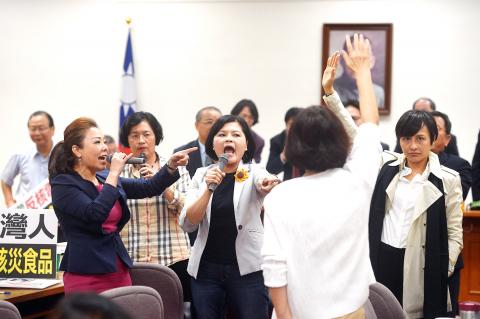The Chinese Nationalist Party (KMT) caucus yesterday accused the Democratic Progressive Party (DPP) of trying to shield the Council of Agriculture from answering a call by KMT lawmakers to present a special report on imports of food products from Japan’s radiation-affected regions.
The caucus also slammed DPP Legislator Chiu Yi-ying (邱議瑩) for using a term widely considered offensive by Aborigines to describe KMT lawmakers during a verbal spat.
KMT lawmakers asked the legislature’s Economics Committee to call on the council to prepare a special report in today’s committee meeting on government measures relating to its plan to lift the ban on food imports from five Japanese prefectures that were affected by the Fukushima Dai-ichi nuclear power plant meltdown in 2011.

Photo: George Tsorng, Taipei Times
The proposal was vetoed by their DPP counterparts, who said that the committee meetings held yesterday and today are for reviewing the council’s budget and that the schedule is tight.
KMT Legislator and committee member Chang Li-shan (張麗善) told a news conference later yesterday that the KMT had made the request because the public hearings called by the government had failed to do their job.
“Ten public hearings in three days is not what an issue of such importance deserves. We hope the council takes this issue seriously, as the imported goods will mostly be manufactured from agricultural products, and the report should not wait until the review of its budget is completed,” Chang said.
KMT caucus whip Sufin Siluko (廖國棟) then lashed out at Chiu, accusing her of using a “discriminatory term for Aboriginal people that was directed either at me or another [Aboriginal] KMT legislator, Yosi Takun (孔文吉)” during the meeting.
“I did not actually hear her say the word, but the media and our office did,” he said, playing a recording of Chiu’s remarks several times at the news conference.
The term Chiu used was huan-a (番仔, uncivilized person) in Hoklo (commonly known as Taiwanese).
Chiu was heard saying it was “no use talking to these huan-a.”
Sufin Siluko said that the KMT caucus is recommending that Chiu be referred to the Discipline Committee for disciplinary review.
Yosi Takun demanded that Chiu apologize to the nation’s Aborigines.
“The country formally changed the official name of the group from the [discriminatory] ‘mountain people’ to ‘Indigenous people’ as early as 1991. I cannot believe that a DPP lawmaker just used the word in the legislature,” he said.
In response to the criticism, Chiu asked the KMT lawmakers to “look it up in the Wikipedia, as the term means ‘unreasonable people,’ and what the KMT lawmakers did in the committee was just that.”
She said she does not understand why she should be sent to the Discipline Committee for using that word.
“They are being paranoid,” Chiu added.
New Power Party Legislator Kawlo Iyun Pacidal, an Amis Aborigine, said in a statement that insofar as Aborigines are still an underprivileged group in Taiwanese society, the word is, in its historical and social context, a pejorative term that was used to refer to Aboriginal people.
“It is definitely not Aboriginal people being ‘paranoid’ when they react strongly to the term; it is part of their real life experience,” she said.
Additional Reporting by CNA

An essay competition jointly organized by a local writing society and a publisher affiliated with the Chinese Communist Party (CCP) might have contravened the Act Governing Relations Between the People of the Taiwan Area and the Mainland Area (臺灣地區與大陸地區人民關係條例), the Mainland Affairs Council (MAC) said on Thursday. “In this case, the partner organization is clearly an agency under the CCP’s Fujian Provincial Committee,” MAC Deputy Minister and spokesperson Liang Wen-chieh (梁文傑) said at a news briefing in Taipei. “It also involves bringing Taiwanese students to China with all-expenses-paid arrangements to attend award ceremonies and camps,” Liang said. Those two “characteristics” are typically sufficient

A magnitude 5.9 earthquake that struck about 33km off the coast of Hualien City was the "main shock" in a series of quakes in the area, with aftershocks expected over the next three days, the Central Weather Administration (CWA) said yesterday. Prior to the magnitude 5.9 quake shaking most of Taiwan at 6:53pm yesterday, six other earthquakes stronger than a magnitude of 4, starting with a magnitude 5.5 quake at 6:09pm, occurred in the area. CWA Seismological Center Director Wu Chien-fu (吳健富) confirmed that the quakes were all part of the same series and that the magnitude 5.5 temblor was

The brilliant blue waters, thick foliage and bucolic atmosphere on this seemingly idyllic archipelago deep in the Pacific Ocean belie the key role it now plays in a titanic geopolitical struggle. Palau is again on the front line as China, and the US and its allies prepare their forces in an intensifying contest for control over the Asia-Pacific region. The democratic nation of just 17,000 people hosts US-controlled airstrips and soon-to-be-completed radar installations that the US military describes as “critical” to monitoring vast swathes of water and airspace. It is also a key piece of the second island chain, a string of

The Central Weather Administration has issued a heat alert for southeastern Taiwan, warning of temperatures as high as 36°C today, while alerting some coastal areas of strong winds later in the day. Kaohsiung’s Neimen District (內門) and Pingtung County’s Neipu Township (內埔) are under an orange heat alert, which warns of temperatures as high as 36°C for three consecutive days, the CWA said, citing southwest winds. The heat would also extend to Tainan’s Nansi (楠西) and Yujing (玉井) districts, as well as Pingtung’s Gaoshu (高樹), Yanpu (鹽埔) and Majia (瑪家) townships, it said, forecasting highs of up to 36°C in those areas